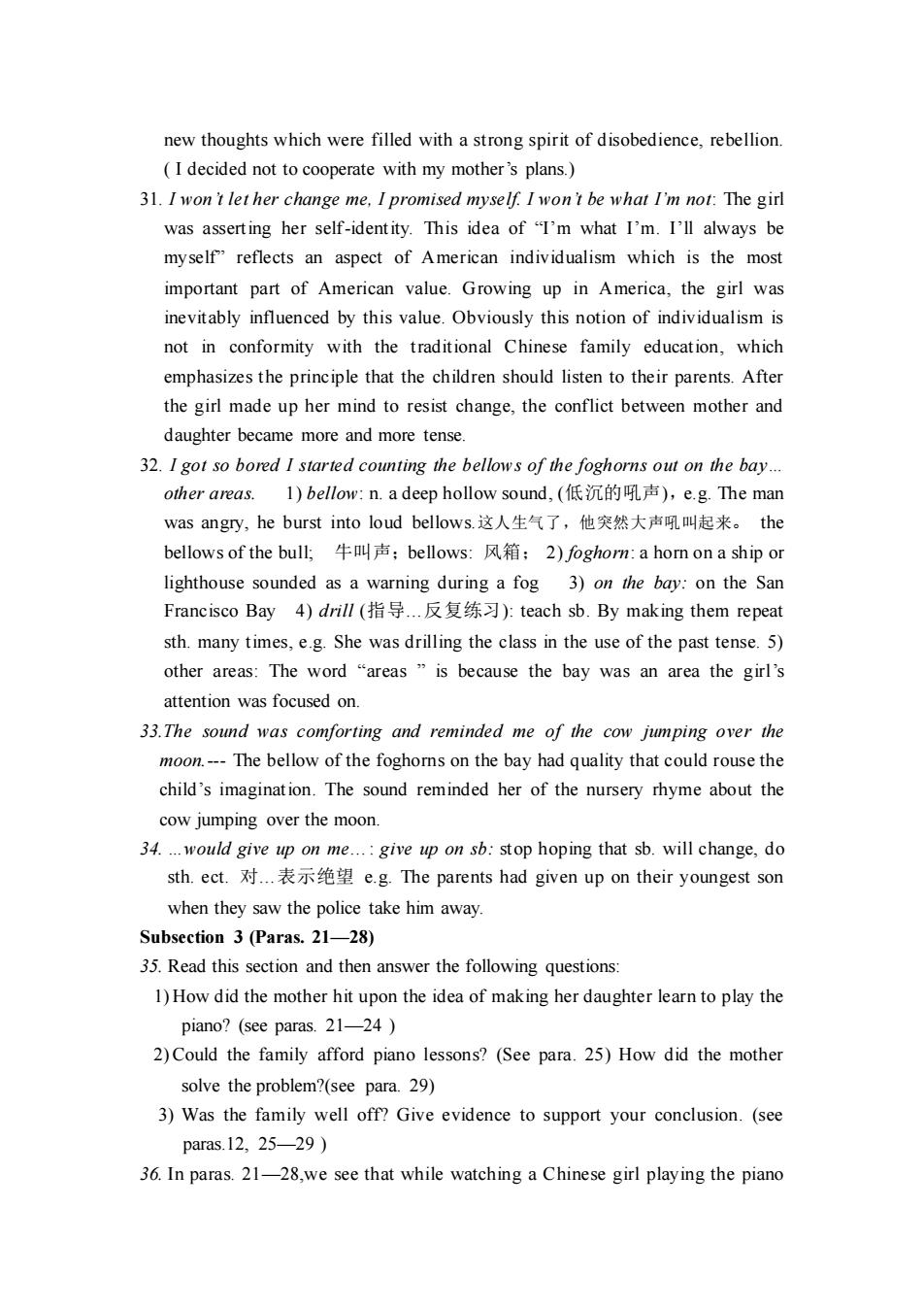正在加载图片...

new thoughts which were filled with a strong spirit of disobedience,rebellion (I decided not to cooperate with my mother's plans.) 31.I won't let her change me,I promised myself.I won't be what I'm not:The girl was asserting her self-identity.This idea of"I'm what I'm.I'll always be myself reflects an aspect of American individualism which is the most important part of American value.Growing up in America,the girl was inevitably influenced by this value.Obviously this notion of individualism is not in conformity with the traditional Chinese family education,which emphasizes the principle that the children should listen to their parents.After the girl made up her mind to resist change,the conflict between mother and daughter became more and more tense. 32.I got so bored I started counting the bellows of the foghorns out on the bay. other areas. 1)bellow:n.a deep hollow sound,(低沉的吼声),e.g.The man was angry,he burst into loud bellows.这人生气了,他突然大声吼叫起来。the bellows of the bull.牛叫声;bellows::风箱:2)foghorn:a hom on a ship or lighthouse sounded as a warning during a fog 3)on the bay:on the San Francisco Bay4)dill(指导.反复练习)teach sb.By making them repeat sth.many times,e.g.She was drilling the class in the use of the past tense.5) other areas:The word "areas is because the bay was an area the girl's attention was focused on. 33.The sound was comforting and reminded me of the cow jumping over the moon.-The bellow of the foghoms on the bay had quality that could rouse the child's imagination.The sound reminded her of the nursery rhyme about the cow jumping over the moon. 34.would give up on me.:give up on sb:stop hoping that sb.will change,do sth.ect.对.表示绝望e.g.The parents had given up on their youngest son when they saw the police take him away. Subsection 3(Paras.21-28) 35.Read this section and then answer the following questions: 1)How did the mother hit upon the idea of making her daughter learn to play the piano?(see paras.21-24) 2)Could the family afford piano lessons?(See para.25)How did the mother solve the problem?(see para.29) 3)Was the family well off?Give evidence to support your conclusion.(see paras.12,25-29) 36.In paras.21-28,we see that while watching a Chinese girl playing the piano new thoughts which were filled with a strong spirit of disobedience, rebellion. ( I decided not to cooperate with my mother’s plans.) 31. I won’t let her change me, I promised myself. I won’t be what I’m not: The girl was asserting her self-identity. This idea of “I’m what I’m. I’ll always be myself” reflects an aspect of American individualism which is the most important part of American value. Growing up in America, the girl was inevitably influenced by this value. Obviously this notion of individualism is not in conformity with the traditional Chinese family education, which emphasizes the principle that the children should listen to their parents. After the girl made up her mind to resist change, the conflict between mother and daughter became more and more tense. 32. I got so bored I started counting the bellows of the foghorns out on the bay. other areas. 1) bellow: n. a deep hollow sound, (低沉的吼声),e.g. The man was angry, he burst into loud bellows.这人生气了,他突然大声吼叫起来。 the bellows of the bull; 牛叫声;bellows: 风箱; 2) foghorn: a horn on a ship or lighthouse sounded as a warning during a fog 3) on the bay: on the San Francisco Bay 4) drill (指导.反复练习): teach sb. By making them repeat sth. many times, e.g. She was drilling the class in the use of the past tense. 5) other areas: The word “areas ” is because the bay was an area the girl’s attention was focused on. 33.The sound was comforting and reminded me of the cow jumping over the moon.- The bellow of the foghorns on the bay had quality that could rouse the child’s imagination. The sound reminded her of the nursery rhyme about the cow jumping over the moon. 34. .would give up on me.: give up on sb: stop hoping that sb. will change, do sth. ect. 对.表示绝望 e.g. The parents had given up on their youngest son when they saw the police take him away. Subsection 3 (Paras. 21—28) 35. Read this section and then answer the following questions: 1) How did the mother hit upon the idea of making her daughter learn to play the piano? (see paras. 21—24 ) 2) Could the family afford piano lessons? (See para. 25) How did the mother solve the problem?(see para. 29) 3) Was the family well off? Give evidence to support your conclusion. (see paras.12, 25—29 ) 36. In paras. 21—28,we see that while watching a Chinese girl playing the piano